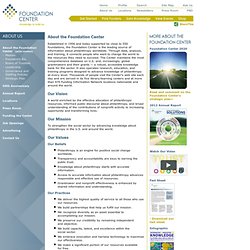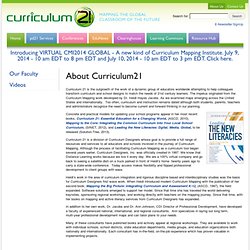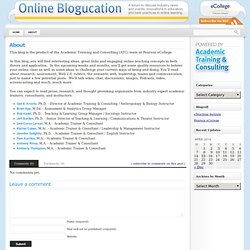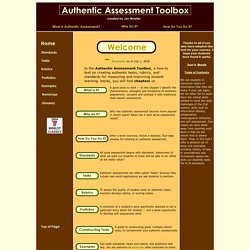

Non-Profit Services. Established in 1956 and today supported by close to 550 foundations, the Foundation Center is the leading source of information about philanthropy worldwide.

Through data, analysis, and training, it connects people who want to change the world to the resources they need to succeed. The Center maintains the most comprehensive database on U.S. and, increasingly, global grantmakers and their grants — a robust, accessible knowledge bank for the sector. It also operates research, education, and training programs designed to advance knowledge of philanthropy at every level. Thousands of people visit the Center's web site each day and are served in its five library/learning centers and at more than 470 Funding Information Network locations nationwide and around the world. To strengthen the social sector by advancing knowledge about philanthropy in the U.S. and around the world. Our Beliefs Our Practices The Center accomplishes its mission by: About Education Next. About Curriculum21. Curriculum 21 is the outgrowth of the work of a dynamic group of educators worldwide attempting to help colleagues transform curriculum and school designs to match the needs of 21st century learners.

The impetus originated from the Curriculum Mapping work developed by Dr. Heidi Hayes Jacobs. As we examined maps emerging across the United States and internationally. Too often, curriculum and instruction remains dated although both students, parents, teachers and administrators recognize the need to become current and forward thinking in our planning. Concrete and practical models for updating your school programs appear in her most recent books, Curriculum 21: Essential Education for a Changing World, (ASCD, 2010), Mapping to the Core: Integrating the Common Curriculum Into Your Local School Curriculum, (SINET, 2012), and Leading the New Literacies: Dgital, Media, Global, to be released (Solution-Tree, 2013).
EdHelper.com - Math, Reading Comprehension, Themes, Lesson Plans, and Printable Worksheets. Internet Literacy - Contents. About IES. What Works Clearinghouse. About « Online Blogucation. This blog is the product of the Academic Training and Consulting (ATC) team at Pearson eCollege.

In this blog, you will find interesting ideas, great links and engaging online teaching concepts in both theory and application. In the upcoming weeks and months, you’ll get some quality resources to bolster your online class as well as some ideas to challenge your current ways of being and doing. You’ll read about research, assessment, Web 2.0, rubrics, the semantic web, leadership, teams and communication, just to name a few potential posts. We’ll talk wikis, chat, discussions, images, Podcasts, video, screencasting and much, much more. You can expect to read prose, research, and thought provoking arguments from industry expert academic trainers, consultants, and instructors: Gail E. Brian Epp, M.Ed. - Assessment & Analytics Group ManagerBrian Epp, M.Ed. - Assessment & Analytics Group ManageBrian Epp, M.Ed. - Assessment & Analytics Group Managerr.
Blogs, Articles and Videos from the World's Top Thinkers and Leaders. AllRefer Health. Authentic Assessment Toolbox Home Page. To the Authentic Assessment Toolbox, a how-to text on creating authentic tasks, rubrics, and standards for measuring and improving student learning.

Inside, you will find chapters on A good place to start -- In this chapter I identify the characteristics, strengths and limitations of authentic assessment; compare and contrast it with traditional (test-based) assessment. Why has authentic assessment become more popular in recent years? When can it best serve assessment needs? After a brief overview, follow a detailed, four-step process for creating an authentic assessment. All good assessment begins with standards: statements of what we want our students to know and be able to do. Authentic assessments are often called "tasks" because they include real-world applications we ask students to perform.
To assess the quality of student work on authentic tasks, teachers develop rubrics, or scoring scales. A guide to constructing good, multiple-choice tests, to complement your authentic assessments. Yahoo! Education - Dictionary, Colleges, Scholarships, Homework Help, Schools, Reference, Thesaurus & more. Resources For The Classroom. K-12 Education & Learning Innovations with Proven Strategies that Work.